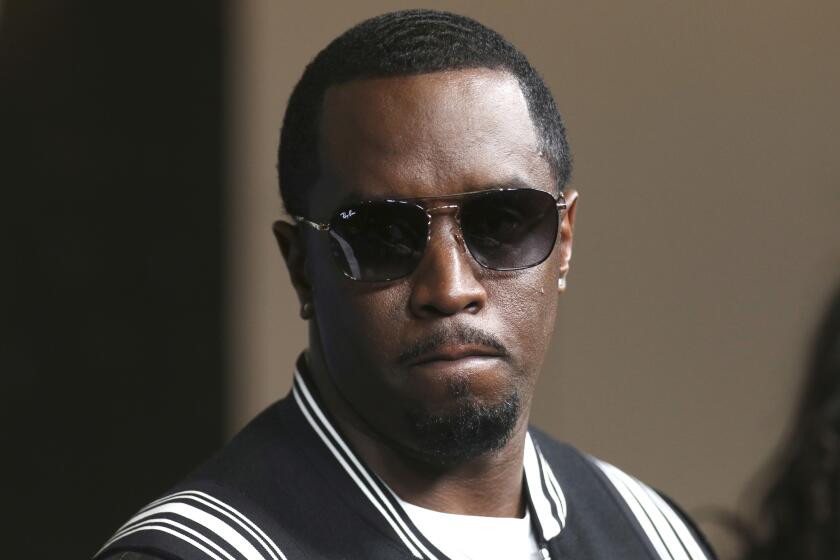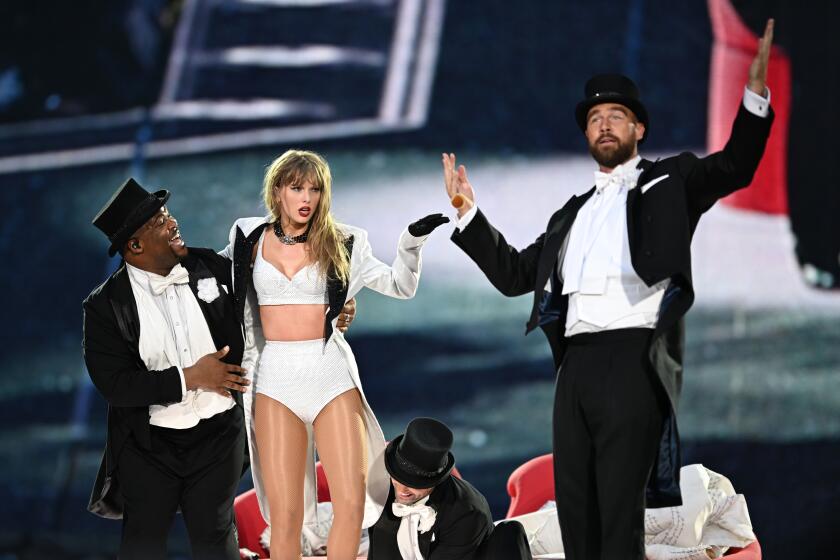‘New Amerykah Part Two: Return of the Ankh’ by Erykah Badu
Erykah Badu
“New Amerykah Part Two: Return of the Ankh”
(Universal Motown)
* * * 1/2
With “New Amerykah Part One: 4th World War,” Erykah Badu sent imagined political futures raging through our collective conscious. Released in 2008, when Bush was still in the White House, Badu funneled her fears into an exotic underworld.
Now with Obama in the White House and a new healthcare bill passed, perhaps Badu feels that her worries have been temporarily assuaged, allowing her to focus again on the timeless subject of love. Whether the specifics involve being needed or wanting to fly away, lusting for someone or letting go, “New Amerykah Part Two: Return of the Ankh” is a velvety, but still appealingly odd, exploration that feels more like a casual counterweight than a heady sequel.
Buzzing and fluttering with synths, harp, piano and almost-subliminal samples that pump in fuzzy, nostalgic soul, “Return of the Ankh” roams far and wide. The music beneath her benefits from detail-oriented producers, including MadLib, the late J Dilla and James Poyser, the last of whom elevates “Window Seat,” with Badu co-producing, into a juicy slice of escapism but with the security of someone missing you back home.
The middle of the album is cut with a computerized vocal declaring that humankind only experiences two emotions, fear and love, kicking off a three-song suite. “Love” is the most simple, with Badu multiplying her voice into a cooing chorus over chilled-out funk.
In “You Loving Me,” the singer enjoys the spoils of the good life while sleeping with a lover’s friends. “That’s terrible, isn’t it,” she chuckles at the end, wise to the fact that it’s just one iteration of a long story.
The next song, “Fall in Love (your funeral)” warns a man not to pursue her lest he wants his life rearranged. Over a come-hither groove with nervous, twittering synths and the occasional whoop of an alarm, she purrs, “You gotta change jobs, change gods or you better get on away from here.”
By the end, Badu is ready for a confession over lounge piano: “I’m a recovering undercover over-lover.” If only all of our addictions could sound as gorgeous as hers. Let the relapse begin.
-- Margaret Wappler Unrelated but three of a kind
The Living Sisters
“Love to Live”
(Vanguard)
* * *
This utterly charming debut from L.A. indie music pals Inara George (The Bird and the Bee), Becky Stark (Lavender Diamond) and Eleni Mandell may warrant the creation of a new life category: triplets separated at birth. OK, so it’s not going to get a lot of use, but the empathetic symbiosis at play in these 10 sweetly ethereal performances deserves some kind of category of its own.
The closest pop antecedent for the ersatz sibling harmonizing over endearingly low-fi subject matter going on here would be that of the Roches, bona fide biological sisters. Mandell’s “Ferris Wheel” dreamily elegizes that boardwalk thrill of yore.
There are songs about babies and cradles -- no great leap given that George was pregnant while they were working on the CD. Some are engagingly innocent, some are gently sexy, as the trio members weave together ‘40s pop vocalizing, ‘50s doo-wop, jazz, folk and country elements in a seamless mélange.
In fact, the whole outing feels like a throwback to a time and place in American culture that probably never actually existed, yet it’s no less rewarding to revel in music that imagines it did. It’s lightweight, but so is a perfect soufflé.
The threesome has been performing around the Southland on and off for years, and whether this moonlighting project has a recording future beyond this effort is anybody’s guess. The great thing about today’s age of unhinged music-making is that quirky one-offs like this can crop up and live for precisely as long as they need to.
-- Randy Lewis Adding more colors to jazz
Christian Scott
“Yesterday You
Said Tomorrow”
(Concord Jazz)
* * *
For a guy who’s earned a reputation for speaking his mind, Christian Scott’s trumpet tone can seem a bit incongruous. Frequently pinching his horn to a low, muted whisper, the genre-blind 26-year-old incorporates elements of funk, rock and hip-hop into jazz, making him the collaborator of choice for a wide variety of musicians, including Mos Def, Prince and even Glen Ballard.
Yet he’s never made an album quite like this. An early leak of a faithful cover of Thom Yorke’s “Eraser” briefly lit up the jazz blogosphere (particularly for drummer Jamire Williams’ replication of the song’s clipped electronic pulse), but the track’s lilting approach feels almost out of place with the album’s unsettling atmosphere.
Built around a skittering, restless rhythm, the police-brutality-inspired “K.K.P.D.” sets the record’s tone with Scott’s murmuring trumpet gathering around the song’s edges like a cold wind before rising to an outraged peak.
Referencing the long-running Louisiana work farm, the slow-burning “Angola, LA and the 13th Amendment” again finds Scott setting aside his mute to glide above Matthew Stevens’ versatile, biting guitar, a pairing that also accentuates the brooding “American’t” and “An Unending Repentance,” which also features an inviting piano solo from Milton Fletcher Jr.
Recorded by jazz icon Rudy Van Gelder, the album’s contemplative sound can feel a bit monochromatic, and a few ballads drift too far into the background. But with many arresting moments of collaboration and expression, “Yesterday You Said Tomorrow” feels like a broad-reaching statement of purpose, one that clearly marks Scott as an artist taking his music to the next level.
-- Chris Barton Newly single and back in action
Usher
“Raymond v Raymond”
(LaFace/Jive)
* * *
The title of Usher’s strong new album alludes to his recent divorce from Tameka Foster, whose brief marriage to the Atlanta-based R&B star (born Usher Raymond IV) provided much of the fodder for his domestic-minded 2008 album “Here I Stand.”
But “Raymond v Raymond” carries another meaning as well, one seemingly directed toward Usher fans disappointed by the change in direction his wedding inspired: Here’s a battle, the title suggests, between the faithful husband of the last few years and the wily lothario of yore.
With tracks like “Lil Freak,” “Foolin’ Around” and “So Many Girls,” the album isn’t coy about which Raymond comes out on top.
Over a thumping Eurodance groove in “OMG” he describes an encounter with a woman in a club that’s unlikely to last beyond tomorrow morning. The reggae-scented “Pro Lover” offers a cheerful justification for the one-night stand: “I’m better when I’m touch and go.”
In “She Don’t Know,” Usher makes the connection to his earlier work more explicit, ending most of his lines with a spirited interjection that openly echoes his up-tempo 2004 smash “Yeah!”
Near the end of “Raymond v Raymond,” the singer temporarily slows the beat for “Papers,” a sleekly produced ballad that appears to address the causes of his divorce: “The only time you’re here for me,” he sings, “is when the bottles popping and everything is sweet.”
-- Mikael Wood
More to Read
The biggest entertainment stories
Get our big stories about Hollywood, film, television, music, arts, culture and more right in your inbox as soon as they publish.
You may occasionally receive promotional content from the Los Angeles Times.






